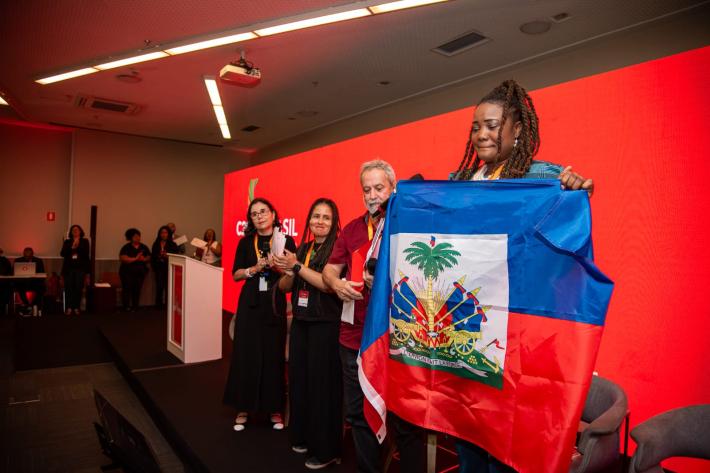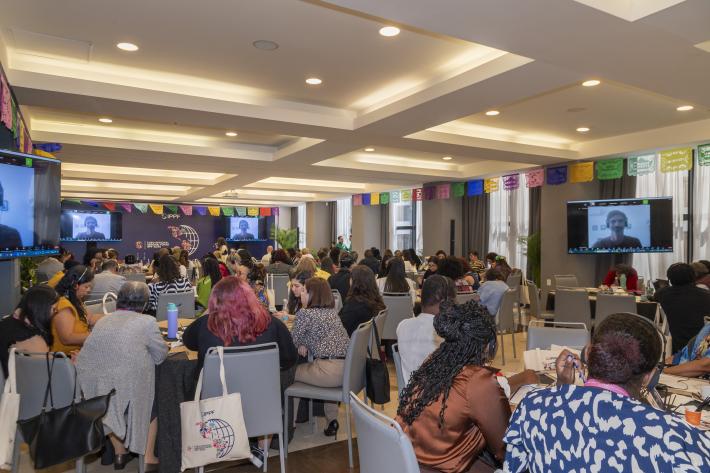Latest press releases
A selection of stories from across the Federation
Americas & the Caribbean
Breaking: IPPF Global Research Exposes Devastating Impact of the Trump Administration
Over Half of Partners and $85 Million Affected
For media enquiries

| 31 July 2024
Venezuela: Only in democracy are rights guaranteed.
Haz click aquí para leer este boletín en español. IPPF expresses our concern about the situation in Venezuela and our total solidarity with its people, who on 28 July received the news from the National Electoral Council (CNE) that the current president, Nicolás Maduro, was elected for a third presidential term. There are serious allegations of a lack of transparency in the process and we join the international community in demanding the publication of the election results, because, as of today, July 31st, the CNE has not shown the results of the election to prove the victory of Nicolás Maduro. It is worrying that the state security forces have responded with violence and repression since the beginning of the mobilisations, which continue, with hundreds of people arrested and a growing number of deaths. In addition to the current emergency, inequality, gender inequality and lack of access to health services, including sexual and reproductive health, have been on the rise for the past 25 years. It is impossible to forget: in Venezuela, the number of femicides has doubled in the last 6 years; 28.7% of people of sexual and gender diversity have been victims of violence by state security forces; 91.5% of complaints of violence against women are shelved or dismissed; legislation on abortion is extremely restrictive and services are very limited; in addition, 7.7 million people have been forced to move because of the socio-political context. With extreme concern, IPPF in the Americas and the Caribbean condemns the Venezuelan government's repression and violence against citizen mobilisations. It is unacceptable that while exercising their right to protest and free expression, Venezuelans are victims of criminalization and physical and political violence. IPPF ACRO joins the Venezuelan society in their demands for respect of democracy because the will of the people through authentic elections is a right and must be guaranteed by the State. ‘The situation in Venezuela further exacerbates the escalation of authoritarianism and violence in our region,’ said Alessandra Nilo, Director of External Relations at IPPF ACRO. ‘Democracy is conducive to states that guarantee and advance rights, including sexual and reproductive rights which, we know, in times of high tension and crisis, are the first to be violated. At this difficult time, we demand that the Venezuelan State returns to the democratic path, strengthens its institutions and respects the rights and wishes of its people. It is essential to protect the dignity and hope of all people, especially girls and women in all their diversity.’ ‘IPPF ACRO and Member and Partner Associations in the region are attentive to the development of events, we remain committed to Venezuelan people and their integral wellbeing, and we will continue to provide sexual and reproductive health care and services in Venezuela and, given the projected intensification of the migration wave, also in surrounding countries such as Colombia, Peru and Ecuador.’ Header image credit: REUTERS/Leonardo Fernandez Viloria

| 16 October 2023
IPPF ACRO express concern over guidance of the Zambian Ministry of Health who advised against the use of the term “sexual and reproductive health and rights”.
At a time of profound and multiple crises, it is worrying that the focus of any government's action is to go back on already consolidated international commitments, particularly those which recognize, based on evidence, that Sexual and reproductive health and rights (SRHR) are fundamental human rights, central to eradicating poverty and achieving sustainable development across its social, economic, and environmental dimensions. SRHR – which encompasses a range of issues, including universal access to SRH services and supplies, comprehensive sexuality education, and ending gender-based violence and harmful practices such as early, child and forced marriage – are fundamental to the ability of all people, especially women, adolescent girls and young people, to lead full, satisfying, healthy and productive lives. SRH services are a critical aspect of SRHR, but a complete understanding of sexual and reproductive health and rights goes far beyond on access to health facilities and services to include an array of social, legal, institutional, and financial arrangements that enable individuals to exercise their rights in general and addresses the underlying social determinants. In this regard, our Latin American community urges the government of Zambia to review its position and, on the contrary, to improve and expand the SRHR services, including increasing funding in this sector, for example by investing in fulfilling the human rights of women and girls, in all their diversity, as gender discrimination is one of the leading determinants of poor health and unwanted SRHR outcomes. It is also key to addressing inequities in access due to poverty and multiple forms of discrimination, stigma and social and economic exclusion affecting various population groups. We conclude by highlighting the importance of evidence-based policies and, in 2023, the data indicates that effective policies are not those based on stigma and discrimination or elimination of rights. On the contrary, effective policies are those that include, care for, and treat all people as subjects of rights, capable of making decisions about their health and reproductive life, with the support of a State committed to promoting citizenship and the human dignity of their people. Here, at IPPF ACRO, we will remain attentive and always willing to contribute so that rights do not go backwards and no one is left behind. In solidarity, Eugenia Lopez Uribe Regional Director for the Americas and the Caribbean

| 17 March 2022
IPPF ACRO present at the Forum of Latin American and Caribbean Countries on Sustainable Development 2022.
The Fifth Meeting of the Forum of Latin American and Caribbean countries on Sustainable Development 2022 was held in Costa Rica - San José from March 7 to 9, in its face-to-face/virtual form due to COVID-19. This event brought together 1,200 people, including government delegates and representatives of international organizations, the United Nations, the private sector, academia and civil society to discuss the progress and challenges of implementing the 2030 Agenda in the region and how the region has been the most impacted by COVID-19 in terms of development from the health, economic and social point of view. Pamela Martín García, IPPF ACRO's Advocacy and Communications Manager, participated in this indispensable space for regional integration and cooperation. First at the Civil Society meeting and then at the Forum, as well as the March 8th rally in Costa Rica During the event for International Women's Day, civil society representatives expressed their concern about the advance of authoritarian proposals in various governments of the region with public policies that generate setbacks in terms of human rights, sexual and reproductive rights. They also denounced the extreme vulnerability of women environmental defenders in different countries. They called on governments to take affirmative action to address the disproportionate impact of the pandemic on women in the region. One important statistic shared during the event was that 68% of the targets of the Sustainable Development Goals continue on an insufficient trend towards 2030 and that only one third of the 111 targets evaluated are on an adequate pace and trajectory. This urges us to continue working to meet them. The greatest challenge today is to eradicate poverty in all its forms and is an indispensable requirement for sustainable development in the region. During the closing ceremony, delegates from the countries, United Nations agencies, representatives of civil society and other participants paid tribute to Alicia Bárcena, Executive Secretary of ECLAC, who bids farewell to this position with full honors and after a formidable performance, always promoting and defending the human rights of all people. It was she, with her lucidity and eloquence, who for more than 20 years incorporated the feminist perspective in ECLAC and its actions. We join in the heartfelt recognition of a leader who knew how to build in the adversity of inequalities a light of hope throughout the region.
















